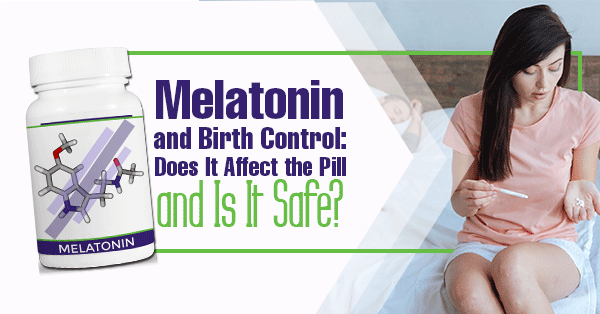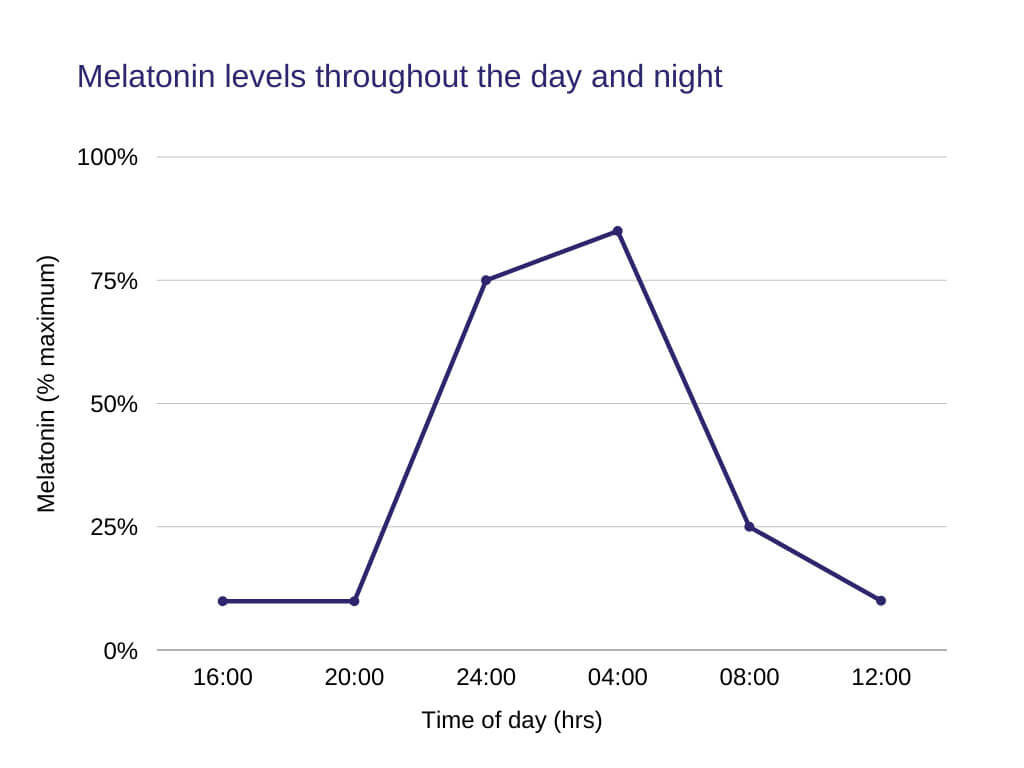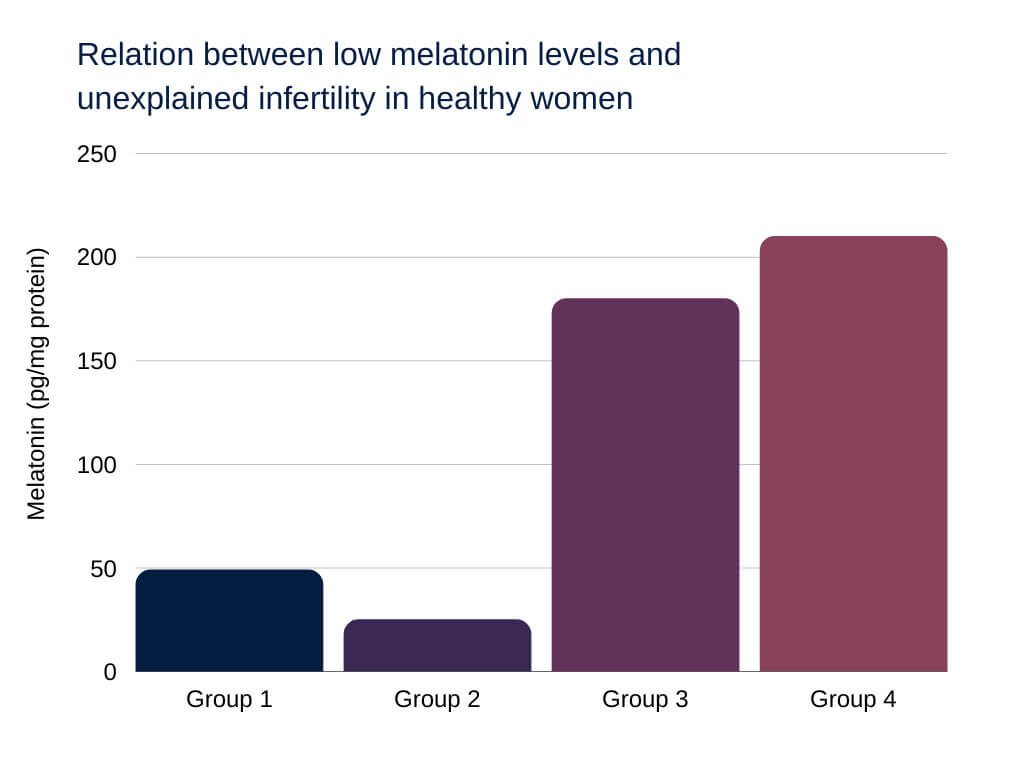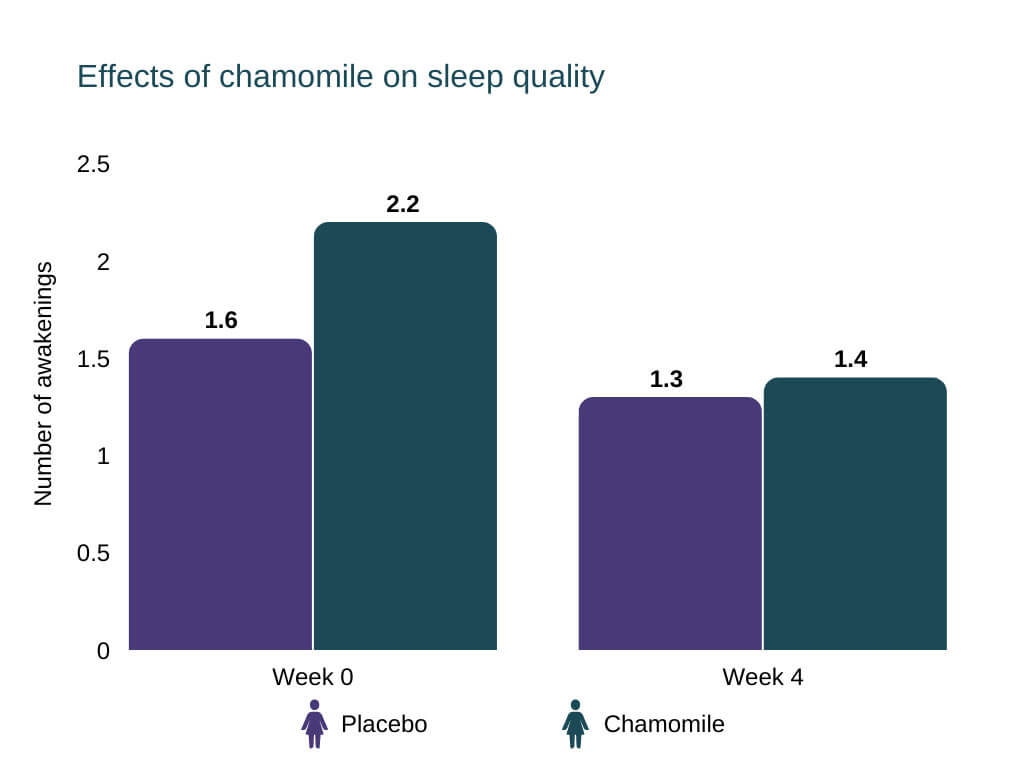
Melatonin is a supplement designed to improve the quality of your sleep, but many women fear it may interact or cancel out their birth control.
This article examines precisely what melatonin is, how it is used, whether it can affect your birth control pills, and possible natural alternatives.
Key Takeaways
- Melatonin is a naturally produced hormone your body uses to regulate your sleeping patterns.
- Melatonin supplements are usually recommended for people with sleeping difficulties.
- Melatonin has other benefits like alleviating jet lag, aiding weight loss, and preventing seasonal depression.
- Using the hormone with birth control pills could result in too much melatonin in your bloodstream.
- High levels of melatonin could cause daytime drowsiness.
- There is no evidence that melatonin cancels out birth control.
What Is Melatonin?
Melatonin is a naturally occurring hormone produced by the pineal gland. The pineal gland is located in your brain and functions mainly to detect and receive information about the light intensity of the environment [1]. It also regulates several hormones that affect female fertility and the menstrual cycle.
When it is dark, the pineal gland secretes melatonin into the bloodstream, which is essential in regulating your internal circadian rhythm. An increase in your melatonin levels leads to you feeling calm and drowsy.
When it is light, the production of melatonin slows or stops.

Will Melatonin Affect Birth Control?
Melatonin won’t cancel your birth control pills. That said, it’s documented to increase the likelihood that IVF will be successful. Though studies suggest it improves chances of conception, nothing suggests it is strong enough to cancel hormonal birth control.
That doesn’t make the use of the supplement advisable when you’re on birth control. Oral contraceptives have been shown to affect sleep patterns. The estrogen and progesterone in birth increase melatonin levels, increasing sleep time.
Simultaneously using a melatonin supplement could result in your body producing too much melatonin. This may raise your natural melatonin levels high enough to make you drowsy during the day too, which could interfere with your daily routine.
Melatonin has also been shown to have a positive effect on fertility. It has been used in women going through fertility treatment, which could counteract the effects of birth control pills, although this has not yet been scientifically confirmed [15].

If you are looking at taking melatonin but are worried about the interaction it may have with your oral contraceptives, consider using a form of non-hormonal birth control, like a birth control sponge, diaphragm, or male condoms.
Can You Take Melatonin on Birth Control?
Despite their possible interactions, no evidence suggests taking melatonin supplements cancels out or reduces the effectiveness of birth control pills. Taking a melatonin supplement for a few days to overcome jet lag or short-term sleeplessness should not cause your body to produce too much melatonin for an extensive period.
However, using melatonin with birth control could cause more severe side effects due to elevated melatonin levels, including:
- Headaches
- Diarrhea
- Nausea
- Anxiety
- Effects on human reproduction [16]
If you are still unsure of the effects of adding external melatonin as a sleep aid while using birth control pills, and you do not want to use non-hormonal contraceptives, you may consider male birth control pills for your partner.
If you experience spotting or breakthrough bleeding while using melatonin and contraceptive drugs, there is a chance your birth control may not be working. You must use a backup birth control method until you can see your doctor.
Uses of Melatonin in the Body
Melatonin acts by binding to receptors in the brain and cells in the gonads, kidneys, cardiovascular system, and parts of your body’s immune system.
The hormone is vital for many bodily functions, including [2]:
- Regulating circadian rhythms, also known as your internal 24-hour clock
- Managing your sleep cycle according to the day-night environmental pattern
- Modulating the onset of puberty, with high levels of melatonin shown to delay puberty in some cases
- Exerting some control over your core body temperature, melatonin acts as a thermoregulator, lowering your internal temperature
- Energy metabolism–managing the daily distribution of energy and your body’s metabolic functions
- Exhibiting anti-aging and antioxidant properties
- Regulation of blood pressure [3]
- Possible anti-tumor properties and ability to slow down the progression of prostate and breast cancer [4]
Due to the extensive use of melatonin in your body, many people choose to take melatonin supplements for various benefits.
What Are the Benefits of Melatonin Supplements?
Exposure to light at night can interrupt melatonin production, giving you trouble falling asleep. Adding external melatonin supplements is mainly recommended to promote sleep in people suffering from sleep disorders.
Besides this, taking melatonin supplements can provide several therapeutic benefits, including:
- Treatment of chronic insomnia: Melatonin helps to improve sleep quality and decrease the number of times you wake up during the night [5]
- Treatment of sleep disturbances [6]
- Alleviating jet lag
- Possibly aiding weight loss [7]
- May help ease the symptoms of seasonal depression [8]
- Reduces the oxidative stress in your body as it acts as an antioxidant [9]
Are Melatonin Supplements Safe to Take?
In most cases, the short-term use of melatonin is safe even when taken in extremely high doses and should cause mild to no side effects [10]. The long-term (more than six months) use of melatonin and its interaction with other medication has not been thoroughly researched [11].
It is also essential to keep in mind that the FDA does not regulate melatonin dietary supplements or their recommended dosage.
How are Melatonin Supplements Taken?
Synthetic melatonin supplements come in various forms like:
- Tablets
- Capsules
- Gummies
- Liquid drops
- Diffusers
- Vape liquid
Typically a melatonin dietary supplement has a directed dosage between 1mg and 10mg, one to two hours before you go to bed. Dosage varies widely from person to person and should be discussed with your doctor.
Melatonin Side Effects
When used for less than six months, melatonin should not cause any significant side effects. Most people can safely use oral melatonin supplements with only mild side effects such as [12]:
- Dizziness
- Headache
- Nausea
- Sleepiness
- Agitation
- Mood swings
- Irritated skin
Other Melatonin Interactions
Melatonin may interact with other medicines like:
Melatonin supplements may interact negatively with some medications, although this has not been studied extensively enough.
One of the major concerns for women interested in melatonin supplementation is whether it will interact or block the work of oral contraceptives in the form of hormonal birth control.
FAQ
Below are the answers to some of the most commonly asked questions about melatonin and birth control.
Does Melatonin Cancel Out Nexplanon Birth Control?
There is no evidence that melatonin cancels or interacts with the action of Nexplanon.
Nexplanon is a hormonal birth control implant placed in your arm. It releases a hormone called progestin that prevents pregnancy by thickening the mucus in your cervix to prevent sperm from passing through, as well as stopping ovulation.
Does Melatonin Affect Birth Control Depo Shot?
There is no proof that melatonin negatively interacts with the birth control Depo shot.
The Depo-Provera injection also contains progestin and is administered once every three months. It can be a good alternative for women who are worried about taking melatonin while on the pill.
Does Melatonin Cancel Out Birth Control Pills?
No, there is no research or evidence that melatonin cancels out birth control pills. Interactions between the supplement and hormones in the pill may cause your body to produce too much melatonin and increase its effects.
Does Melatonin Cancel Out Mirena?
No interactions have been found between Mirena and taking melatonin.
Mirena is an IUD that releases the hormone levonorgestrel, which prevents pregnancy. Mirena effectively prevents pregnancy for up to six years.
Alternatives to Melatonin
If you choose not to use melatonin to improve your sleep, plenty of sleep aid alternatives are available.
Lifestyle Changes
Some lifestyle changes that can improve your sleep quality include:
- Avoid drinking coffee or caffeinated drinks up to four hours before going to bed
- Regular exercise [17]
- Avoid using electronic devices like phones or TVs, which produce light that will disrupt your body’s natural melatonin production
- Establish a regular sleep schedule
- Avoid taking naps
- Practice meditation, yoga, or other calming therapeutic activities to help reduce stress
Natural Remedies
Some herbs and plants have beneficial effects on sleep. The most well-known include:
- Chamomile, which is primarily used in tea form [18]
- Valerian root, taken as a pill, extract, or tea [19]
- Lavender oil, used in a diffuser [20]
- Magnolia bark, in capsule form [21]

Cognitive-Behavioral Therapy
Cognitive-behavioral therapy involves several exercises that manage your behavior before, during, and after going to bed. Unlike medications and supplements, the treatment provides long-lasting effects for sleep disorders like insomnia.
Cognitive-behavioral therapy is also suitable for people of all ages and has been proven especially effective in children and teens [22].
Conclusion
Despite many claims that melatonin supplements cancel birth control, there is no evidence of the interaction. Women taking birth control pills are advised only to temporarily use melatonin and always check with their doctor first.
Safely taking melatonin and birth control can significantly improve sleep quality, and help you get back your energy, whether you have insomnia, a sleep disorder, or even just jet lag.
References:
- JH;, Korf HW;Schomerus C;Stehle. “The Pineal Organ, Its Hormone Melatonin, and the Photoneuroendocrine System.” Advances in Anatomy, Embryology, and Cell Biology, U.S. National Library of Medicine, pubmed.ncbi.nlm.nih.gov/9670565/.
- JH;, Korf HW;Schomerus C;Stehle. “The Pineal Organ, Its Hormone Melatonin, and the Photoneuroendocrine System.” Advances in Anatomy, Embryology, and Cell Biology, U.S. National Library of Medicine, pubmed.ncbi.nlm.nih.gov/9670565/.
- K;, Baker J;Kimpinski. “Role of Melatonin in Blood Pressure Regulation: An Adjunct Anti-Hypertensive Agent.” Clinical and Experimental Pharmacology & Physiology, U.S. National Library of Medicine, pubmed.ncbi.nlm.nih.gov/29603319/.
- Li Y;Li S;Zhou Y;Meng X;Zhang JJ;Xu DP;Li HB; “Melatonin for the Prevention and Treatment of Cancer.” Oncotarget, U.S. National Library of Medicine, pubmed.ncbi.nlm.nih.gov/28415828/.
- Aulinas, Anna. “Physiology of the Pineal Gland and Melatonin.” Endotext [Internet]., U.S. National Library of Medicine, 10 Dec. 2019, www.ncbi.nlm.nih.gov/books/NBK550972/#.
- Xie Z;Chen F;Li WA;Geng X;Li C;Meng X;Feng Y;Liu W;Yu F; “A Review of Sleep Disorders and Melatonin.” Neurological Research, U.S. National Library of Medicine, pubmed.ncbi.nlm.nih.gov/28460563/#:~:text=Melatonin%20has%20been%20shown%20to,sleep%20regulation%20and%20neuronal%20survival.
- Amstrup AK;Sikjaer T;Pedersen SB;Heickendorff L;Mosekilde L;Rejnmark L; “Reduced Fat Mass and Increased Lean Mass in Response to 1 Year of Melatonin Treatment in Postmenopausal Women: A Randomized Placebo-Controlled Trial.” Clinical Endocrinology, U.S. National Library of Medicine, pubmed.ncbi.nlm.nih.gov/26352863/.
- VK;, Lewy AJ;Lefler BJ;Emens JS;Bauer. “The Circadian Basis of Winter Depression.” Proceedings of the National Academy of Sciences of the United States of America, U.S. National Library of Medicine, pubmed.ncbi.nlm.nih.gov/16648247/.
- E;, Reiter RJ;Tan DX;Osuna C;Gitto. “Actions of Melatonin in the Reduction of Oxidative Stress. A Review.” Journal of Biomedical Science, U.S. National Library of Medicine, pubmed.ncbi.nlm.nih.gov/11060493/.
- RJ;, Andersen LP;Gögenur I;Rosenberg J;Reiter. “The Safety of Melatonin in Humans.” Clinical Drug Investigation, U.S. National Library of Medicine, pubmed.ncbi.nlm.nih.gov/26692007/.
- J;, Arendt. “Safety of Melatonin in Long-Term Use (?).” Journal of Biological Rhythms, U.S. National Library of Medicine, pubmed.ncbi.nlm.nih.gov/9406044/.
- ICK;, Besag FMC;Vasey MJ;Lao KSJ;Wong. “Adverse Events Associated with Melatonin for the Treatment of Primary or Secondary Sleep Disorders: A Systematic Review.” CNS Drugs, U.S. National Library of Medicine, pubmed.ncbi.nlm.nih.gov/31722088/.
- Pourhanifeh, Mohammad Hossein, et al. “Melatonin: New Insights on Its Therapeutic Properties in Diabetic Complications.” Diabetology & Metabolic Syndrome, BioMed Central, 8 Apr. 2020, www.ncbi.nlm.nih.gov/pmc/articles/PMC7140344/.
- Wirtz PH;Spillmann M;Bärtschi C;Ehlert U;von Känel R; “Oral Melatonin Reduces Blood Coagulation Activity: a Placebo-Controlled Study in Healthy Young Men.” Journal of Pineal Research, U.S. National Library of Medicine, pubmed.ncbi.nlm.nih.gov/18289163/.
- Espino, Javier, et al. “Impact of Melatonin Supplementation in Women with Unexplained Infertility Undergoing Fertility Treatment.” Antioxidants (Basel, Switzerland), MDPI, 23 Aug. 2019, www.ncbi.nlm.nih.gov/pmc/articles/PMC6769719/.
- Olcese, James M. “Melatonin and Female Reproduction: An Expanding Universe.” Frontiers in Endocrinology, Frontiers Media S.A., 6 Mar. 2020, www.ncbi.nlm.nih.gov/pmc/articles/PMC7067698/.
- SD;, Youngstedt. “Effects of Exercise on Sleep.” Clinics in Sports Medicine, U.S. National Library of Medicine, pubmed.ncbi.nlm.nih.gov/15892929/.
- SN;, Adib-Hajbaghery M;Mousavi. “The Effects of Chamomile Extract on Sleep Quality among Elderly People: A Clinical Trial.” Complementary Therapies in Medicine, U.S. National Library of Medicine, pubmed.ncbi.nlm.nih.gov/29154054/.
- J;, Shinjyo N;Waddell G;Green. “Valerian Root in Treating Sleep Problems and Associated Disorders-A Systematic Review and Meta-Analysis.” Journal of Evidence-Based Integrative Medicine, U.S. National Library of Medicine, pubmed.ncbi.nlm.nih.gov/33086877/.
- R;, Lillehei AS;Halcón LL;Savik K;Reis. “Effect of Inhaled Lavender and Sleep Hygiene on Self-Reported Sleep Issues: A Randomized Controlled Trial.” Journal of Alternative and Complementary Medicine (New York, N.Y.), U.S. National Library of Medicine, pubmed.ncbi.nlm.nih.gov/26133206/.
- Chen CR;Zhou XZ;Luo YJ;Huang ZL;Urade Y;Qu WM; “Magnolol, a Major Bioactive Constituent of the Bark of Magnolia Officinalis, Induces Sleep via the Benzodiazepine Site of GABA(A) Receptor in Mice.” Neuropharmacology, U.S. National Library of Medicine, pubmed.ncbi.nlm.nih.gov/22771461/.
- G;, Dewald-Kaufmann J;de Bruin E;Michael. “Cognitive Behavioral Therapy for Insomnia (CBT-i) in School-Aged Children and Adolescents.” Sleep Medicine Clinics, U.S. National Library of Medicine, pubmed.ncbi.nlm.nih.gov/31029183/.



Leave a Reply